Behind the Mask: Leadership Skills of a Catcher
by: Chico Lizarraga
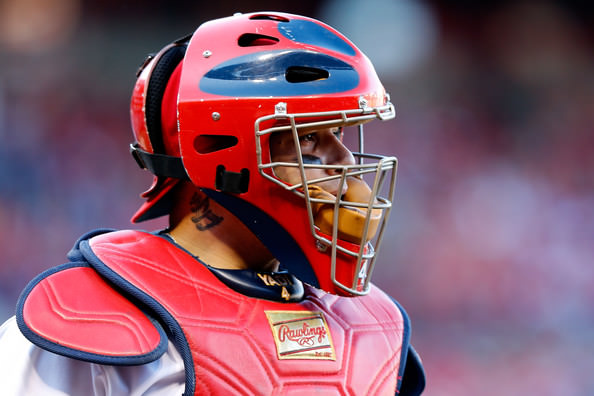
One of my good mentors, was Bill Herkelman, he always said to me, "You don't have a good team unless you have a good catcher." There is a lot of truth to that statement by Coach Herk. The catcher spends a majority of the time with the ball in his hand (besides the pitcher), the catcher is the only guy on the field who can view every position player and the catcher is the guy everyone else can see every pitch. There is a reason nearly 50% of MLB managers are former catchers.
I don't think it's the fact that the catching position is the ultimate sacrifice of a position. It takes a gritty, unselfish, and hardworking kid to be a catcher. But I don't think it's the fact that after a three-hour practice, they go catch another five bullpens or the fact that their job is to literally go "unnoticed," that is technically a good day behind the dish for a catcher. Catchers are taught to sacrifice their body for the betterment of the team-and that they do.
So, what makes catching the ultimate position to lead from? Why are there tons of good leaders today, who were former catchers? I believe there are a variety of reasons that allows catchers to shine. After all, you are only as good as the catcher you have.
Relationships with Umpires:
Yes, umpires. The first thing a catcher does before he squats down into his home is he starts the relationship right there, with that home plate umpire. The catcher greets the umpire by first name and shakes his hand firmly. The start to any relationship is a good first impression and a development of trust.
Throughout the game, this bond can build. You may get a call or two to go your way because of this communication. During my playing days I had some of the strangest conversations with some of the nicest people and every once in a while, you will get the one umpire who doesn't shut up-those ones, well those ones. But, in all seriousness, to this day the majority of umpires in the community know my name and who I am, not because I sacrificed my body to protect them but because of the relationships I started there.
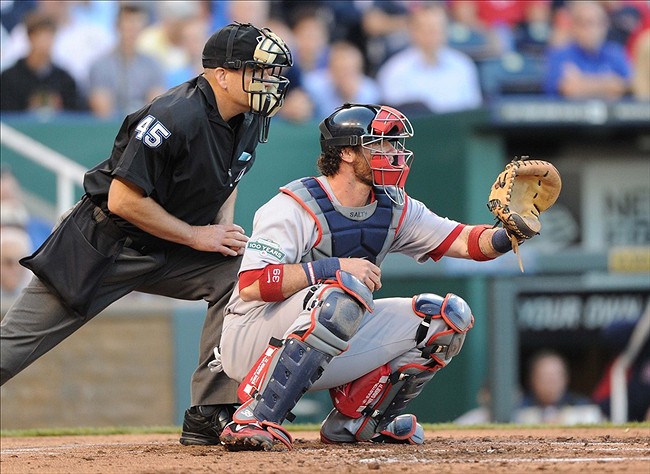
All Eyes on You:
I'm not talking about the coaches or even the cute girls sitting up at the top of the bleachers. I'm talking about your teammates. The catcher is essentially the quarterback of the team. His leadership from behind the dish, speaks volumes about how his team will handle the big moments.
Every single guy can see when you start to get lazy and let a ball slide past you. Every single guy expects you to catch each ball thrown your way, block each ball and occasionally throw the runner out. A catcher must lead by example, if his work ethic does not match his presence behind the dish, what do his teammates think of him?
Protecting the Plate:
That 17-inch square piece of rubber means a lot. The game is built around that plate. We pitch the ball over that plate, we hit from that plate and the team who steps on it the most comes out on top. I wouldn't say that the catching position is about getting in the way of a runner trying to score from third base but rather protecting the guys who wear the same colors as you.
Leaders create an environment where people can feel safe and protected. By this I mean good leaders take the blame and give the credit. By this I mean when the go ahead run is on third base and your heart is pumping, and anxiety is going through the roof, can you handle it? Are you going to block the 1-2 curveball in the dirt? Your teammates expect you to.

Emotional Stability:
Catching most of the time is fun, in my opinion. It starts to suck when you are not swinging it well. Most coaches say, "Catch a good game and hit .250, will be fine." We'll no, no one's up there trying to strike out but it happens. The ability to put my gear back on and go out there like nothing happened, may be the biggest attribute I receive from catching.
Everyone can see, feel, and read your body language. The ability to move onto the next pitch and not have that AB carry over to my defense has taught me wonders. By staying in that present moment and having a short memory it has allowed me to always keep my emotions in check on and off the field.
Communication Skills:
The catcher is in command of the field. At times he is loud in his relay calls from the outfield, at times he communicates with his infield where to play, at times he relays information to his coaches and at times he provides a word of encouragement to his pitcher.
The ultimate communicator of the field. He has to know when to go visit the mound, he has to know what to say to different individuals, some he may joke with or get to laugh, others he may go tell them to grow a pair and throw the ball over the plate. The ability to calm a pitcher's nerves or the pitcher seeing you (the catcher) looking cool, calm, collected and having the situation under control is an emotional boost in itself.
This sort of coaching/mentoring of teammates is the early onset to a major factor of why the catching position is the leadership spot on the field.

Pitch Calling:
I was fortunate enough to have coaches who trusted in my ability to call the game. If you are a catcher who is less fortunate, work hard and work with them to better understand how to sequence and tunnel pitches. Why is this a leadership skill you may ask? Well it is, it takes knowledge, experience, preparation, and feel to be able to understand what hitters are thinking and at the same time understand your pitchers' strengths. Quick decision making, is a vital trait.
This is also a skill in itself because the catcher-pitcher combo can control the tempo and pace of the game. That trust built with the pitcher is another golden rule to being a successful catcher.
Respect is Earned:
The catching position. The most taxing position on the body, right up there with being able to throw a baseball hard. I can remember getting back at 12:30am from a long road trip after catching a four-game series and going and sitting in the ice bath for 20 mins. Just to be able and prepared to catch the mid-week game on Tuesday.
Passion. Hustle. Passion. I once had professor say to the class, "I'd rather hire an athlete who is passionate about their sport and teach them about business, rather than hiring a business person and teach them to be passionate." Respect doesn't favor the unprepared nor the less passionate one, respect is earned every day.
Hustle. A lot of guys hustle. Few are willing to hustle day in and day out, over and over again. Few are willing to take a FB in the dirt to the gut, few are willing to be where you're supposed to be when you're supposed to be there, and few are willing to hustle to go unnoticed. Respect is earned.
It Is Not About How Good You Are, It Is About How Good You Are Going To Be: Baseball Journey by: Chico Lizarraga
I always had passion for the game of baseball, but I am going to be honest it never really hit me until about the end of my freshman year in college. I had a tremendous support system, with parents who would go out of their way to help my brother and me succeed. I can remember my dad hitting us thousands of ground balls and pop flies until the sun went down. I can remember my mom gearing up in catcher's gear and catching us while we pitched (not too many moms do this, plus we threw hard). I can remember traveling and playing against talented youth baseball teams with friends who I won't ever forget.
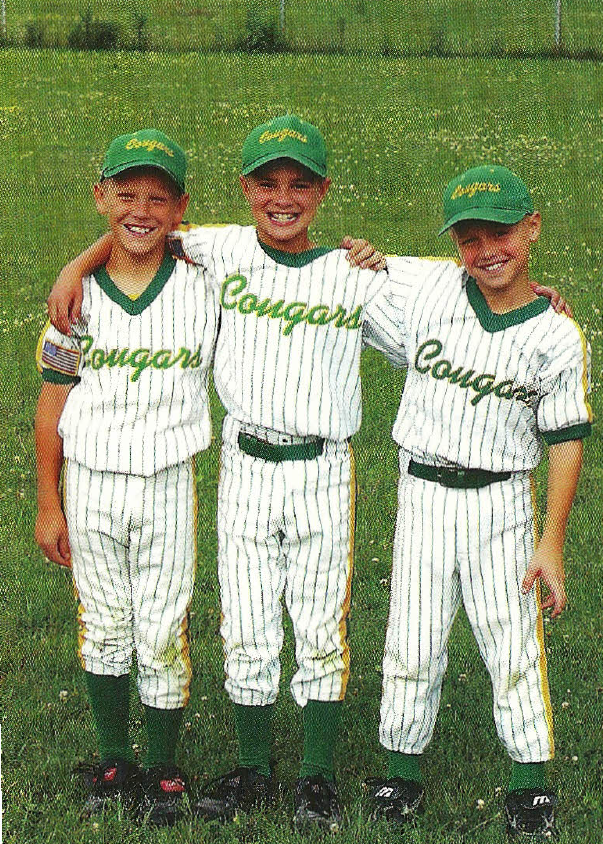
Again, baseball was just something we did growing up. It became a way of life and an obsession entering my sophomore year of college. I was putting in extra work after practice, lifting weights, and doing all the right things, so I thought. I saw results here and there, but not how I would have liked. My junior year of college approached, and I had a down year. My best asset of being able to catch, block, and throw declined and my ability to hit went backwards.
I had to reevaluate what I was doing and be honest with myself. I was not that good. I am the only one that could answer this question every day I got up and looked in the mirror, "Did you put in the work to chase what you could be?" My final year of playing baseball had arrived, my senior year. I understood that I must be willing to fail, to be uncomfortable, to grow, to learn, and to be my own best coach. I did exactly that.
My obsession to my craft did not have an excuse. It did not give a shit if I didn't feel like it. My will power and discipline had already formed my habits. Consistency and owning my routine ruled my life. People say that if you want to change your life, look for something you do in your daily routine, this is true. I would have three to four different workouts throughout the day. I would lift weights early in the day and pay out of pocket to have a trainer. I would follow my Driveline program and hit before practice, then I would have a team practice. Some days we would even bring in an outside source for Strength & Conditioning- I would then do this after practice, and then I would spend another hour or two hitting on my own. I still felt like I wasn't doing enough. Practice time was usually my easiest "practice" of the day and usually I felt like I was getting worse during this time, I am being serious, because I was so invested into what I was doing.
People, who aren't obsessed, won't get it and that is okay you don't need to. I would lie on the floor of this dirty warehouse, taking notes, learning, watching video over and over again. Studying the best hitters in the world, understanding that my swing was nowhere close to what they were doing. I was not that good. I lived in the batting cage, repeating my mechanics over and over again. I would do this until I couldn't get it wrong. I would strive to master it, and then I would make it more challenging by adding variability. I hit more balls off a tee and picked up more buckets of balls than anyone who will ever step foot inside Mount Mercy University again. This was all to be just an average baseball player by the way.
Everybody in the baseball community thinks that the baseball side is the essential part of performing. I would highly disagree, along with striving to improve my swing, I transformed my body. I began to eat the right things, sleep better, remove people who did not help me get to where I wanted to go, and used the power of boredom to my advantage. As much time as I put working on my baseball skills, I put just as much, if not more time into increasing my athletic ability. I knew I had to get stronger, move better, and move faster if I wanted to become the player I wanted to be. I fell in love with strength and conditioning. I wrote shit down, I watched videos, I studied, and I prepared. The power of boredom allowed me to research the good from the bad and to use the content I had learned to help increase my mental and physical states. There is nothing in life that gives you more confidence than knowing that you put in the work. Put in the work, even when no one was watching.
The Swing
My whole life I had been taught the verbal cues of "Swing Down," "Knob to the ball," "Stay short," and all of these can be good cues to some kids. I was a small, scrawny kid that was taught to hit the ball the other way preferably on the ground or on a line. Throughout my youth career I was a sub-par hitter, in high school I was a sub-par hitter, and most of college I was a sub-par hitter.
In 2012-13, I had a coach by the name of Desi Druschel. I remember taking a round of BP and I had peppered the L screen on a line five times in a row. After the round, he came up to me and discussed what I felt and what he saw. I was ecstatic because I was a young buck amongst these grown men and I thought I put on a good round. Coach Druschel said to me, "Chico, there is so much more in there. You can be a doubles and home run hitter. There is a lot more in there."
At the time I thought and the majority of my team members thought- "What?" "We are trying to hit home runs?" I had always grown up thinking that putting the ball in play, hitting low line drives, and not trying to do too much was the answer. This was baffling to me; a coach telling me essentially to swing harder.
For those of you who aren't familiar with Coach Druschel, he was ahead of the game in many aspects. I worked on things he thought I should work on, but my intent wasn't fully there. I had seen some success my sophomore year at the plate because of this. Coach Druschel had moved on and my junior year of college rolled around. The results were not there. Going into that summer before my senior year, something ticked inside.
I finally became honest with myself and understood that if I wanted to take the next steps as player, I had to change. My thought process that summer, fall, and winter going into my final senior spring season was that no one was going to be more prepared than I was. I craved the result so intensely that the work became irrelevant. Leadership to me has always been about leading myself and by doing so others will follow. That had always been my definition, and as the years have progressed I would say it has changed to creating more leaders rather than forging more followers.
I had a notebook I carried with me. Within this notebook I had practice plans, my daily hitting routines, strength work, pulldown numbers, and tons of notes from guys I thought I could learn from. I wrote down successful cues-"self-talk"- that would work for me in game (I still use them to this day). Video was huge for me, I was my own coach. I learned from guys on twitter who posted videos. Coach Druschel still acted as a mentor to me as he would help out by videoing my swing and compare it side by side with other big leaguers. We would discuss ideas for drills and what we thought I needed to improve on.
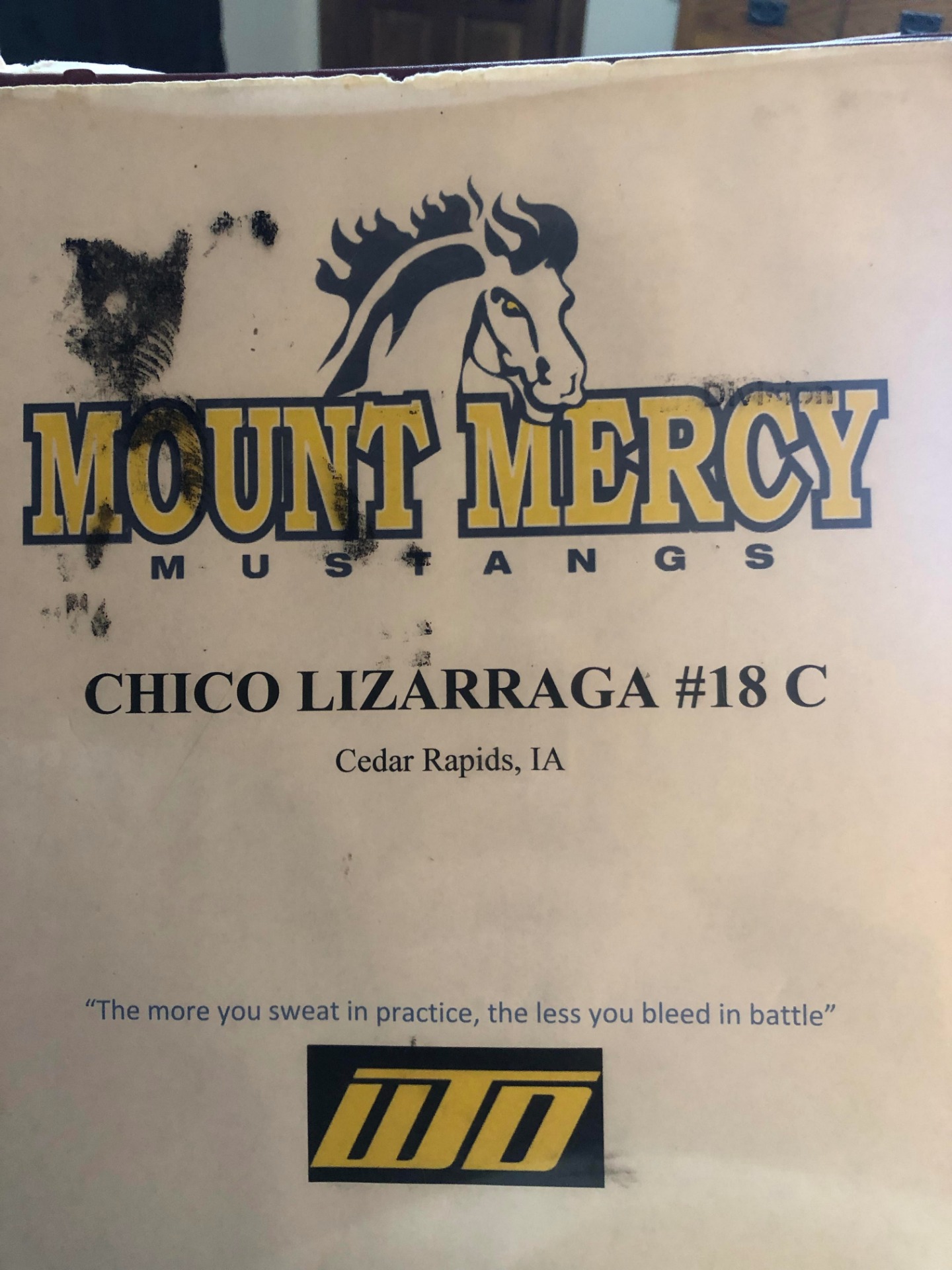
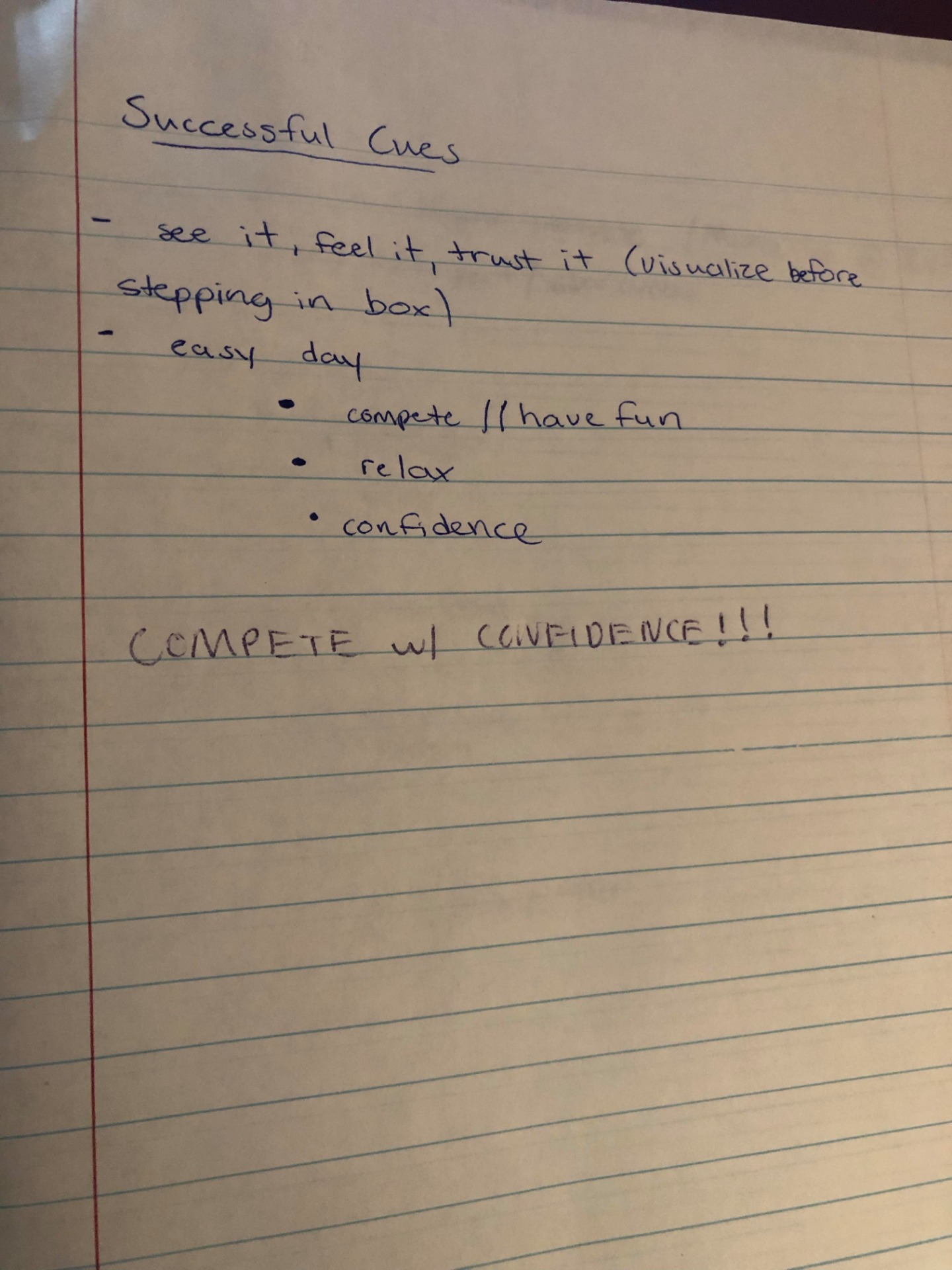
I learned from the best just like every other hitting coach: Bonds, Pujols, Miggy, Trout, etc. I don't know if Coach Druschel meant to do this on purpose or if he had just enjoyed watching his swing like most people. He would always show me video of Josh Donaldson. I fell in love with the leg kick, the way his body flowed, the exaggerated barrel tip at the time and shoulder load. The best thing I could've done for my career was to try to mimic the movement patterns of the professionals.
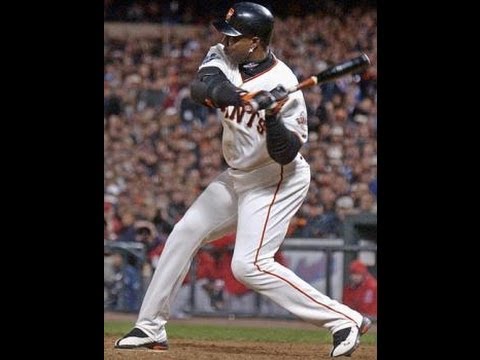
Yes, I know, you hear hitting coaches all over talk about how you should not try to swing like the pros. "Oh, but this kid doesn't have the same capabilities, he doesn't have the bat speed, or he is too small." You know what I think? It is bullshit. Why put a limit on yourself? Why not strive to swing like the best in the world? There is a ton of value in being able to develop movement patterns of that of the greats. At the same time, I do understand that there are physical limitations that we must access and work through.
My focus became three things: my load, my barrel path, and the pitches I swung at. At the time we didn't really use weighted bats (I learned about them more the following year when Pete Lauritson was at the U of I), we didn't have any technology, and we didn't use radar guns during our hitting. With this I had to make the most with what I did have. Time, energy, and effort. I saw Baseball PDS swinging pipes on twitter and it was something I tried to copy. I knew that if I had a "deep whoosh" I was doing something right. My intent also changed by trying to swing as fast as I possibly could each swing and hit the ball as far as I possibly could.
My load became a leg kick, this definitely helped change my mindset as a hitter and freed up my body to move more athletically. At the time I didn't really understand the hip coil, but the leg kick helped me naturally do this. The purpose of my load was to help sync my body and to read the pitch. My upper half I thought about "getting a running start with my hands" and loading into my shoulder (much like Donaldson).
In the past, I was "stiff" almost too stiff; I was tight, bunched up like a pretzel. This loading process helped me to unlock my body and remove slack, enabling me to move better and quicker. The pipe was huge for me, I got feedback from the noise created and I knew I had to get my barrel in the zone longer. In the past, I had little margin for error because my barrel was in and out of the zone so quick. My focus of getting on plane with the pitch for as long as possible helped dramatically. Lastly, I hunted fastballs in the zone that I could drive. Curveballs/sliders, yeah that is a good pitch. But I knew my strengths; I would get a fastball and not miss it. Pitch recognition and swinging at pitches in the zone more often is something I wish I had more time to work on.
Throughout my first three seasons as a collegiate catcher I was a career .260 avg. hitter. My senior season I hit .330 avg. with 20+ extra base hits. I played in 146 games during my career and threw out 63 base runners (thank you Driveline for helping me). I had always been a pretty good defensive catcher but what I had accomplished offensively and what I had taught myself and learned about myself along the way, no one can ever take that away from me.
Fail often, fail more, fail better
If you are unwilling to fail, you are unwilling to succeed. You must be comfortable being uncomfortable. Part of this obsession and irrational thinking I had, it encouraged me to not be afraid to stand alone, I didn't want to blend in. Failure was a major part of the growing curve for me and I encourage you to get uncomfortable.
What would've happened in my playing career if I didn't risk adding a leg kick or changing my mindset to do damage? I probably would've stayed the same and I probably wouldn't be coaching. You don't know, unless you are willing to try new things. To this day I try something new in the weight room every week, in order to challenge myself and in order for growth to occur.
Do not fear failure but rather fear not trying. I can remember countless days; I am sitting in the cage alone, wondering to myself "What the hell am I doing?" Many days I didn't see any progress or I would go backwards, but I stuck with the process. I would continue to beat on the craft relentlessly. There was a series in Marion, IL about 1/3 of the way into my senior season. It was a four game series against two different opponents, I think that weekend I struck out 10 times. Some of the coaches became weary of what I was doing at the plate. I didn't, I took it as a learning experience, all I could do was learn from it.
The following week during practice, I hit so many balls off the machine; I had blisters playing in the upcoming weekend series. All you have control over is how you will respond. The only way for progress to occur and for us to move forward is by failing and learning from these experiences. "Every strike out, brought me closer to my next home run." I didn't succeed on purpose because of some extraordinary talent I had, I had success because I was willing to get back up one more time.
Leadership
In order to lead championship culture it starts with YOU. The small daily habits and actions created consistency. It was never based on how I felt, it drove my behavior, and the motto was to WIN THE DAY. I believe that will power is a learned behavior that takes discipline and energy to sustain. The mind is a beautiful thing, you don't need some drug or to travel somewhere or to have this or that-----the mind can do much more (David Goggins).
I was criticized yet again for not being vocal enough, for not going out of my way to help the other guys on the team. I was an average player, with an obsession for greatness; it dwelled on me 24/7 to get better. I knew I wanted my senior year to end on my terms, winning was the only option. Daniel Coyle is noted for saying, "It takes 10,000 intense hours practicing your craft." A leader is someone who is the vision of our future self; my goal was to embody this.
People often say, "Your best player has to be your hardest worker." I wasn't our best player, but what I did have was an uncommon desire to improve. I lead by example, people think leaders need to be some sort of cheerleader or a vocal guy and I am here to tell you that is bullshit. People follow what you do, not what you say. Everyday my job was to outwork every single guy on our team, set the tone, inspire them to be more than what they were, and give them hope and security.
How do you lead yourself? You must constantly ask yourself this and make sure your friends, values, vision, finances, day to day decisions, and the value you bring to others are aligning with your life. I want to use our 2016 Mount Mercy Baseball team as an example of what champion culture looks like and how leadership can help create this.
Going for Gold-"The People"
Our 2016 team had a clear and compelling vision for what we wanted to accomplish. Every single guy had bought into the vision of our team, every single guy had a role and they understood their role. The purpose behind driving the culture of the team, led to individuals being engaged and inspired to do more. It was clear to everyone on that roster, that we knew what we wanted to achieve and why we wanted to achieve it. Our core values and what we stood for, was shown every time we took the field. People knew what to expect and that the game would be played the right way.
Our standards of behavior- our daily decisions, our expectations, and our accountability were aligned throughout our team. We had committed and unified team members, this is the heart of culture (some call this chemistry). To be honest, you could've rolled balls out there for us to practice and we would've got something accomplished. The relationships built within the team were so genuine that we expected great things out of each other.
The trust developed between team members and our ability to communicate effectively with one another, led us to do great things. The environment we had was fun, we knew when to work and when to play. Simon Sinek speaks on this, "If you get the environment right, you can get people to do great things." Our culture of excellence was embedded throughout every single player that season. You may not be the most charismatic leader and that is okay, but if you can get people to believe in you and what you have to say and you invest time in your people, "gold" becomes a standard for those around you too.
The Salesman, the Researcher, & the Teacher: Coachingby: Chico Lizarraga
I have been a part of coaching for 8 years now between high school, collegiate, and youth levels. I have worked with kids from the ages of 7-26 years old. I have seen a lot and been a part of a lot, as a player and as a coach. I have succeeded and I have failed more times than I can count. So, why would you listen to a 24 year old that only has been an "assistant" talk about the difference between successful and non-successful coaches? Well you are right I am no position to say, I am only going to talk about the experiences, the lessons, the mentoring, and the knowledge I have gained from being around coaches who have helped shape my beliefs and who I am.
Think about a coach you have had, what did they do that made you enjoy them? Think about a coach who you maybe did not enjoy being around, what were they like? We have all experienced this, it is life, what is important is that you take the good and the bad and you learn from them. When an Athletic Director goes to hire a Head Coach, it may be one of the hardest decisions he/she has to make. It is like recruiting players to your team, you do not know what to fully expect and what you are going to get from this person.
I have been blessed with some great coaching in my short career. They have all brought great value to my life and have encouraged me along the way, I thank them for that. In my experience, as a baseball coach what separates the best from the rest is not necessarily what they are teaching as it relates to baseball, but what they are teaching about life. Every head coach is knowledgeable in the game, every head coach (and the general population) "thinks" they work hard, and every person has talent (s). This is generally true, the good coaches I have been around have talent, everyone has talent, but the great ones have something to say, and the way that they say it, gets the people to listen. This helps separate good and GREAT coaches. It is the difference between getting a bad team to .500 and a good team from .600 to .750.
How do you build CHAMPIONSHIP culture, how do you instill this sort of belief and mindset into your team setting?Think about some of the best teams you have been a part of, or maybe one your favorite sports teams. What did they do to build a championship caliber team? There is usually someone out front who helps lead this champion effort, through vision, unity, and empowerment. This person must lead by example; they must set the tone every day, the leader is what we inspire to be like.
I am going to break coaching down into three primary categories: the salesman, the researcher, and the teacher. Every category brings its own values to the table and each category has its pitfalls. The purpose behind doing this is that you can have an idea of what type of leader you want to be and what type of environment you want to create. Coaching is just a small sample size; every successful person however, needs a coach.
The Salesman
People become intrigued with the Salesman because he is selling something people want. The Salesman knows when to smile, when to talk, and is good at selling you his product. He becomes so good at delivering his message that he forgets to listen to his people and becomes weary of being open to other sales ideas, because his voice has gotten him this far. The Salesman is an excellent relationship builder; this is how he has lasted selling products to his clients. He is able to make people feel safe, protected, comfortable, and cares for them. His excellent interpersonal skills will continue to allow success in his business, but often times he will disengage from the people closest to him and he will lose sight of the purpose of his business because he gets caught up in himself. The Salesman can bring in money, he can deliver the message, but is the Salesman willing to do the same thing over and over again, only to see similar results?

The Researcher
The Researcher is knowledgeable. He is invested in giving you all the right information and helping develop you as a student. His knowledge, preparation, and skills do not go unnoticed. The researcher has devoted his life to studying his craft. It is an obsession. The mind becomes flooded with information, data, and technical skills so much that he may lose sight of how to communicate the message effectively to his students. His interpersonal skills may not be like the Salesman, but his effort and work ethic help shadow this. Like any good researcher he continues to learn, he continues to be self-aware, and he continues to advance. The Researcher works not only to learn the content, but also strives to make the content easier to understand for his students.

The Teacher
The teacher is humble. The teacher comes to class everyday prepared, confident, effective, and eager. The teacher understands that many of his students may not take away anything from his math class. His objective is to set them up in an environment that best enables them to succeed and most importantly the 15 minutes he has with the students before the math class begins, he discusses the topics of life. He understands that 99% of his students will not go on to be mathematicians, he understands that in his 25 years of teaching he has only won "gold" one time for his class. His purpose, meaning, and relationships with the students mean much, much more. The teacher is strong in his beliefs; a tradition, a culture, and perspective in his class room setting has been established. His words are there to motivate, encourage, inspire, and when necessary provide feedback. The teacher is a continuous learner, his way is not the only way; the best way for that student is his way. The teacher may not get the credit he deserves and has to take the blame for his mistakes. The teacher creates a fun environment to learn, to participate, to communicate, he gives them a voice, and he empowers his students to do more. This teacher leads his classroom by example; his goal is to create more leaders, and to create an impact much bigger than himself when he is gone.
